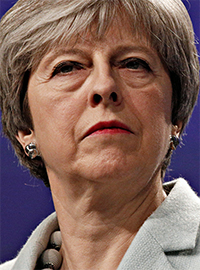| Theresa May Confirms the Peril of Squishy Centrism |
 |
|
By Timothy H. Lee
Thursday, May 30 2019 |
"Our people look for a cause to believe in. Is it a third party we need, or is it a new and revitalized second party, raising a banner of no pale pastels, but bold colors which make it unmistakably clear where we stand on all of the issues troubling the people? A political party cannot be all things to all people. It must represent certain fundamental beliefs which must not be compromised to political expediency, or simply to swell its numbers." —Ronald Reagan, speaking to the Conservative Political Action Conference (CPAC) in 1975. In our era of hyperpartisanship, it’s understandable that many people desire a more moderate political climate in which compromise rather than combativeness prevails. In Gallup’s most recent survey on the matter, 50% of respondents said that they prefer greater compromise among political leaders, versus just 22% who prefer that political leaders stick to principle. As the political adage goes, however, “There’s nothing in the middle of the road but yellow stripes and dead armadillos.” This month, British Prime Minister Theresa May provided just the latest illustration of the perils of moderation at the expense of principle. Last week, May accepted reality and announced her intent to resign as Prime Minister of Britain. In 2016, British voters defied expectation and elitist opinion (sound familiar?) by voting in favor of “Brexit” withdrawal from the European Union. May had opposed Brexit, and since that time failed miserably to execute British departure. Throughout her three years as Prime Minister, Ms. May attempted to appease all competing factions with a centrist approach. But that only ended up alienating all factions. Then this week, British voters confirmed their dissatisfaction in the E.U. parliamentary elections by demanding that their leaders deliver on Brexit, with or without an accord with the E.U. itself. Specifically, voters cast their most votes for Nigel Farage’s Brexit Party, which was formed only a few months ago. There wasn’t even a close second among the competing parties. It’s worth highlighting at this point that everyday British voters proved far more prescient than their supposed superiors among the chattering classes. Just as leftist economists like Paul Krugman and Steven Rattner predicted that Donald Trump’s 2016 victory would collapse the American economy, leftists in Britain and Europe predicted catastrophe should British voters do the unthinkable and support Brexit. Instead, Britain has somehow survived and even outperformed the E.U. economy. The story is the same here in the U.S., of course. In August 1988, George H.W. Bush advocated a “kinder, gentler” America, perhaps suggesting a contrast to the preceding eight years under his predecessor Ronald Reagan. During the 1980 presidential campaign, of course, Bush attempted to ridicule Reagan’s supply-side economic policy as “voodoo economics” in favor of a more centrist agenda. But whose presidency proved the most successful and consequential? By pursuing a more muscular and confrontational approach toward the Soviet Union after a decade of moderate “détente,” Reagan won the Cold War without firing a shot. “Mr. Gorbachev, tear down this wall,” Reagan thundered in Berlin, in defiance of the more cautious and moderate voices in his administration who urged restraint. Similarly, his supposedly “extremist” economic agenda resulted in an economic surge unprecedented in history. In contrast, Bush’s presidency is perhaps remembered most for his pursuit of “moderation” by abandoning his “read my lips: no new taxes” pledge in pursuit of a more centrist and accommodationist approach toward Congressional Democrats. The sputtering economy toward the end of Bush’s tenure allowed the unproven and unprepared Bill Clinton to relegate him to a one-term presidency. More recently, Donald Trump has managed to provide the U.S. economy with escape velocity after eight years of Obama era malaise by pursuing a decisively deregulatory and tax-cutting agenda, whereas the rest of the global economy has lagged. Time and again, the lesson is clear. Although moderation and centrism often appear attractive in the abstract, the “bold colors” of conservatism to which Reagan referred in 1975 have proven reliably successful. And as a consequence, voters have rewarded leaders that pursue those policies, and punished leaders that weakly favored accommodation and squishy centrism. Theresa May offers just the latest illustration of the perils of that path. |
Related Articles : |
























